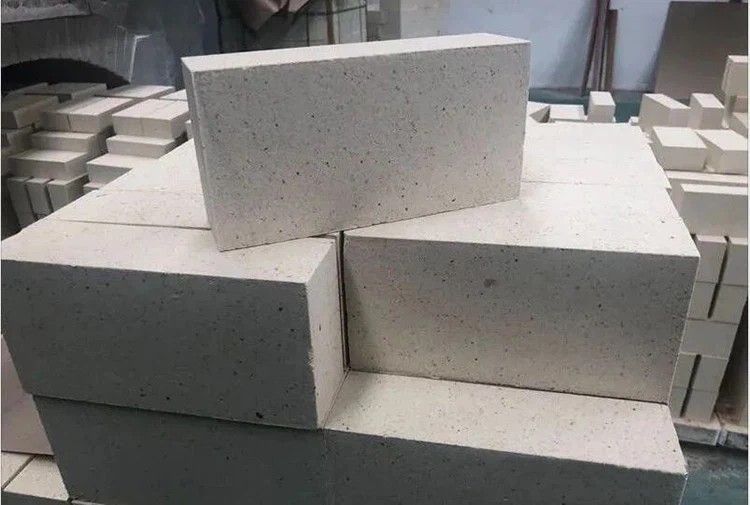PRODUCTS
Insulation Silica Brick
Insulation silica brick is a very special material, which is an acidic material with a silica content of more than 92%. It is characterized by resistance to acid slag erosion. It has high high temperature strength. Load softening start temperature is 1450~1670℃. Moreover, it will not deform for a long time under high temperature. Lightweight silica bricks do not change in crystal form above 600 C. The coefficient of expansion is small. Has high thermal shock resistance. Below 600C, the crystal transformation is very large, the volume change is large, and the thermal shock resistance becomes
Composition: Premium materials such as high alumina oxide, magnesium oxide, and silicon carbide, with customizable composition based on client requirements.
Form: Available in powder, brick, board, and castable forms to suit various application needs.
Refractoriness: Standard range from 1200°C to 1800°C, with options for higher temperature customization.
Application Fields: Widely used in industries such as steel, cement, glass, and petrochemicals for furnace lining and insulation.
Packaging: Options include 25 kg bags, bulk bags, and custom packaging solutions compliant with global transportation standards.
Introduction
Our experienced R&D team can customize the material, form, and size according to your specific application needs while ensuring compliance with international quality standards. With rigorous quality control and advanced production facilities, we guarantee products with high refractoriness, excellent compressive strength, and long-lasting durability. Whether you are in the steel, cement, glass, or petrochemical industry, we are your trusted partner, supporting the success of your projects.
For customization inquiries, please feel free to contact us. We will provide tailor-made solutions based on your requirements.
Insulation Silica Brick Details
Insulation silica brick is a very special material, which is an acidic material with a silica content of more than 92%. It is characterized by resistance to acid slag erosion. It has high high temperature strength. Load softening start temperature is 1450~1670℃. Moreover, it will not deform for a long time under high temperature.
Lightweight silica bricks do not change in crystal form above 600 °C. The coefficient of expansion is small. Has high thermal shock resistance. Below 600°C, the crystal transformation is very large, the volume change is large, and the thermal shock resistance becomes poor. Lightweight silica bricks are made of natural silica as raw material, plus mineralizers, and are slowly fired at 1350-1430°C in a reducing atmosphere.
1. The thermal conductivity is only half of that of ordinary silica bricks, and the thermal shock resistance is good
2. The starting temperature of load softening can reach 1600°C, which is much higher than that of clay insulation bricks
3. Excellent fire resistance, the highest service temperature can reach 1550°C
4. The thermal stability is better than that of dense silica bricks, and it can be used for a long time at 1500~1550°C without contact with slag
Applications
Insulation silica bricks can be applied to:
blast furnace blast part, communicated with blast furnace air extractor;
Good thermal insulation performance in the convex lower part of the glass kiln vault;
Partition walls of the carbonization chamber and combustion chamber of coke ovens, regenerators and sedimentation chambers of steelmaking open hearth furnaces, soaking furnaces, glass melting furnaces, firing kilns for refractory materials and ceramics;
Vaults and other load-bearing parts of kilns;
The high-temperature load-bearing parts of the hot blast stove and the top of the acid open hearth furnace.
Physical And Chemical Indicators
|
牌号Brand |
S-1.0 |
S-1.1 |
S-1.2 |
SM-1.8 |
|
|
Bulk Density (kg/m3) |
1 |
1.1 |
1.2 |
1.80-1.95 |
|
|
Cold Crushing Strength (MPa) |
3 |
4 |
5 |
20 |
|
|
≤ 2% Permanent Linear Change (℃) |
1450 |
1500 |
1550 |
- |
|
|
350℃±10℃ Thermal Conductivity(W/m.k) |
0.50 |
0.60 |
0.70 |
0.20 |
|
|
@T2 Refractoriness Under Load (℃) |
1400 |
1420 |
1520 |
1280 |
|
|
Chemical Composition(%) |
SiO₂ |
91 |
91 |
91 |
77-81 |













